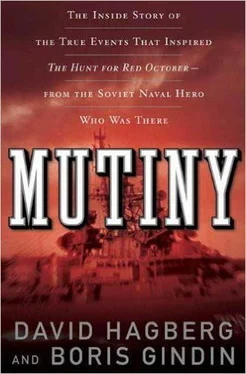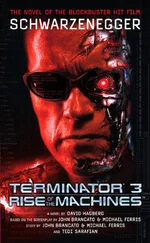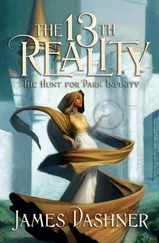Shein turns on his heel and starts toward the door. He may get in trouble for walking out on an officer, but he doesn’t have to stand there taking that kind of shit.
“Wait, Sasha!” Sablin cries. “You have to calm down! I was just making a little test. I don’t want you to be angry with me.”
Shein turns back. He’s confused. What’s he supposed to do? What in heaven’s name can Sablin want with him?
“I want you to sit down now,” Sablin says, his voice lower. “I want to talk to you. This is serious stuff.”
Sablin had an agenda from the start, and nothing in heaven or on earth would stop him. He meant to take his message to the people.
“Moscow has betrayed the October Revolution, so it’s time now for another revolution. All it will take is a bold stroke and positive leadership and the workers will rise up again. They will be with us, Sasha. I need you to be with me!”
That was three days ago, and this evening the first seeds of Sablin’s revolution are beginning to sprout.
Once the officers and midshipmen who had voted with the black pieces are safely locked up below, Sablin sends Shein down to the forward port compartment to stand guard over Potulniy in case the captain figures out a way to escape.
Next Sablin gets on the 1MC and calls a muster of all the crew on the quarterdeck for ten minutes after eight. This will be the moment of truth. A few officers and a handful of midshipmen cannot operate the Storozhevoy without the help of most of the crew. If he has the enlisted men behind him, Sablin knows that he has a real shot at doing this thing, actually disconnecting from the mooring in the morning and getting under way up to Leningrad, where he can broadcast his message of the new revolution directly to the people.
Most of the crew has already returned from liberty ashore. Those in the dining room watching the movie and those in their quarters or already up on deck having a smoke are the first to pull on their winter coats and form up on the aft deck. The others, either on duty or, like Shein, armed and guarding someone, have already been recruited by Sablin. They are his core supporters.
Now it is up to him to convince the bulk of the crew that what he is asking of them is not only necessary but also right and just and that they will have a real chance of succeeding.
The evening is turning surreal in more than one way. A fairly thick fog has formed so that the shore is mostly lost, but the quarterdeck is bathed in a strong white light from the spreaders, and straight overhead the stars are visible, as is a full moon. It’s as if the Storozhevoy and his crew have been transported to a distant universe and for all practical purposes are utterly alone.
Sablin hesitates at a midship hatch before going out on deck and heading aft to confront the crew. He is wearing his black winter coat, with officer’s shoulder boards, and a standard-issue Makarov pistol in a belt holster. His heart was racing earlier in the midshipmen’s dining hall when he was talking to the officers, but he’s calmed down now. In any event, the die has been cast and there’s no way of reversing the clock.
He’s about to step outside when he becomes aware that something is going on belowdecks. He can plainly hear that someone is shouting. It sounds like Potulniy.
Sablin turns and races downstairs as fast as his feet will carry him.
“Sablin is a traitor!” Potulniy shouts. His voice is faint, coming all the way forward near the bow of the ship, but the message is clear nevertheless. There’s trouble.
Coming around a corner, Sablin yanks the pistol out and plays with the safety catch. He’s not much of a shot, but he does know how to fire the weapon.
He pulls up short. Shein is standing at the end of the short corridor in front of the hatch to the sonar compartment where the captain is being held prisoner. The seaman has a dazed, frightened look on his broad peasant’s face. He looks like a deer suddenly caught in the headlights of an onrushing truck.
“Sablin is a traitor!” Potulniy shouts again.
Standing in front of Shein are three of the warrant officers who voted with white backgammon pieces: Gomenchuk, Kalinichev, and Borodai.
“What’s going on?” Sablin demands. “The crew has assembled up on deck. They’re waiting for me!”
“I tried to stop them, but they wouldn’t listen,” Shein stammers.
“Stop who?” Sablin shouts.
“Valery, is that you?” Potulniy cries. “Let me out of here. Don’t be a fool.” It’s more than obvious that the captain is hopping mad, and the warrant officers are clearly distressed. They didn’t count on this complication.
“A couple of sailors down here heard the captain and they tried to be heroes and rescue him,” Borodai explains. “We stopped them.”
But there is no one else in the corridor. “Where are they?” Sablin wants to know. He’s getting shaky again. “Have you locked them away?”
Borodai shakes his head. “There was no reason for it. They won’t cause any trouble now.”
“They’ll tell the rest of the crew!”
“Comrade zampolit, isn’t that exactly what you intend to do on deck?” Borodai asks politely. “By now just about everybody aboard knows that something is going on. So maybe you should get up there and explain the situation.”
Sablin’s heart is racing. He is torn with indecision, even though he knows what has to be done. “Shoot the next man who tries to release the captain,” he gives the order to Shein. “Do you understand me?”
Shein nods that he understands.
Sablin gives the warrant officers a bleak look, then turns on his heel and, holstering his pistol, races back up to the assembled crew on the quarterdeck.
On deck, in the shadows just around the corner from where the men are assembled, Sablin stops a moment to compose himself. The message he’s going to tell these boys is the same one he told the officers an hour ago. Only this time he’ll use easier words, simpler sentences, more clear-cut concepts, and above all a flair for the dramatic and an appeal to their patriotism.
There’s probably not a boy among them, not even among the cynics, the self-proclaimed tough guys, who doesn’t get misty when the idea of defending the Rodina is presented to them. These boys have the black Russian soil beneath their fingernails and the sad Russian songs in their souls; they will jump at the chance to come to the Motherland’s rescue against all enemies—Americans or Moscow bureaucrats.
When Sablin steps out into the light, someone calls the crew to attention, and they snap to.
When Sablin takes his position at the head of the formation he does not guess that word of the mutiny has already spread like wildfire among the crew. Shein and the few other enlisted men Sablin has taken into his confidence have convinced the others that once this necessary business is over they can all go home.
Zampolit Sablin has given his solemn promise.
He hesitates for a moment, mustering the correct words. This is a singular moment in time. He actually feels the long history of the Russian navy stretching back four hundred years. He is becoming an important part of that history.
“We cannot go on like this any longer,” he begins. “You have been lied to. We all have been lied to, even the officers. The Rodina is on the verge of defeat. But the real enemy is not across the ocean, he is right here in the Motherland, and we must do something before it is too late for us all.”
Not one of the 150 enlisted men assembled says a word. No one moves a muscle. It’s obvious that they are surprised by what their zampolit is saying to them, even if they don’t yet fully understand what they are being told. But like Sablin they understand that this is a moment in time that none of them will ever forget.
Читать дальше












